God Is Not One: The Eight Rival Religions That Run the World
£16.00
In God is Not One: The Eight Rival Religions That Run the World, New York Times bestselling author of Religious Literacy and religion scholar Stephen Prothero argues that persistent attempts to portray all religions as different paths to the same God overlook the distinct problem that each tradition seeks to solve. Delving into the different problems and solutions that Islam, Christianity, Buddhism, Judaism, Confucianism, Yoruba Religion, Daoism and Atheism strive to combat, God is Not One is an indispensable guide to the questions human beings have asked for millennia–and to the disparate paths we are taking to answer them today. Readers of Huston Smith and Karen Armstrong will find much to ponder in God is Not One.
Read more
Additional information
| Publisher | HarperOne, Reprint edition (3 May 2011) |
|---|---|
| Language | English |
| Paperback | 400 pages |
| ISBN-10 | 0061571288 |
| ISBN-13 | 978-0061571282 |
| Dimensions | 13.49 x 2.29 x 20.32 cm |

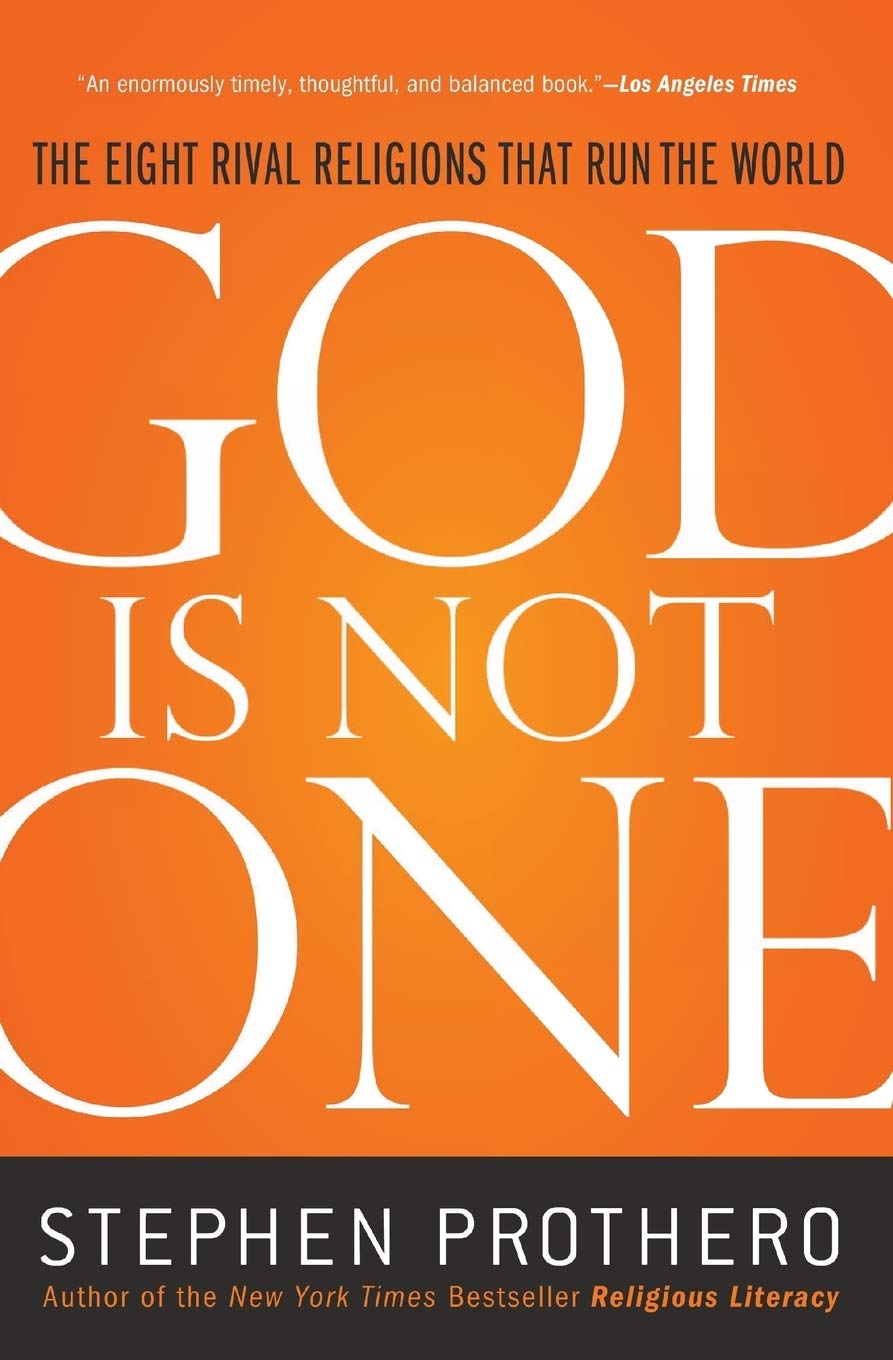
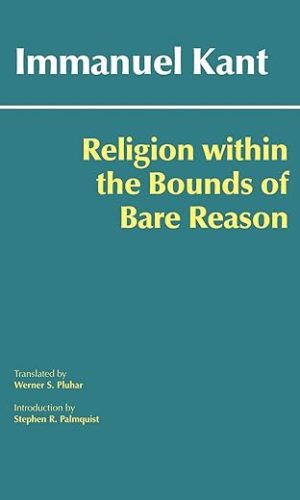
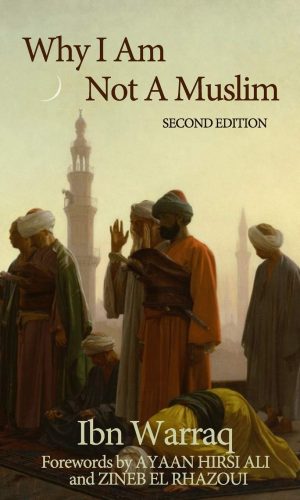
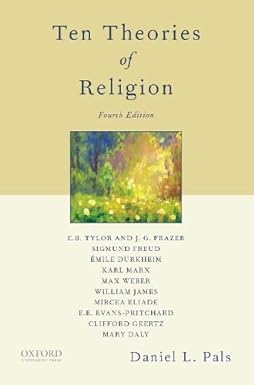
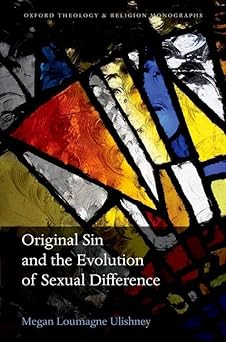

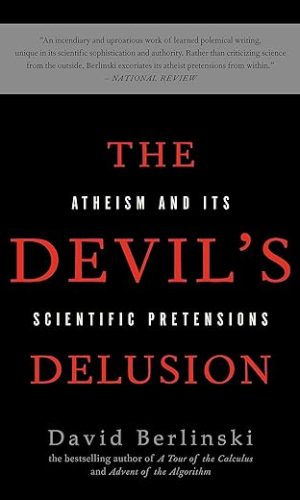
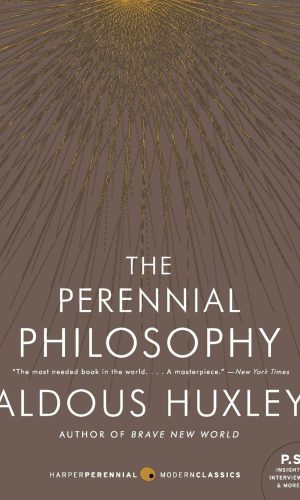
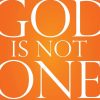
by NWiggins
A good book but very thick so hard to read all in one go. I have taken to reading just the sections I want at the time I need to and going from there.
by Amazon Customer
cover had been torn and shoddily repaired with tape; heavy markings inside
by Dennis Littrell
What Boston University professor of religion Stephen Prothero objects to is the idea that (1) all religions are one, or (2) all religions are “the same idiocy, the same poison.” (p. 324). The first opinion Prothero attributes to “the perennial philosophers” and people like Indian saint Ramakrishna. The second he hangs on those he calls “the New Atheists.” He calls these mind sets “Godthink.”
To counter these misconceptions Prothero has written “God Is Not One” to give the general reader a detailed account of what each of eight religious traditions profess, believe and practice and how they actually do differ. He adds a ninth chapter on atheism which–especially in the writings of “the New Atheists”–he defines as something like a religion itself.
Let’s begin with his line up and how he ranks the major world religions. He begins with Islam calling it today the greatest of all religions. Why? Because even though it currently has fewer adherents than Christianity it is growing faster. Furthermore Prothero insists “Islam is the leader of the pack in terms of contemporary impact.” (p. 19) Additionally Islam’s preeminence is partly due to the fact that Muslims do not restrict their faith to the private realm and do not believe as most Christians do in the separation of church and state.
So here is his line up from the greatest to the merely great, as it were:
Islam
Christianity
Confucianism
Hinduism
Buddhism
Yoruba Religion
Judaism
Daoism
Naturally practically every reader (I would imagine) would disagree with some part of this line up. I certain do not think that Islam is the greatest religion mainly because I disagree with Prothero’s criteria for greatness. In terms of actual historical influence whether for good or evil, whether politically, militarily, culturally or economically Christianity is clearly the “greatest” religion. If we allow our criteria to become more subjective, say by ranking religions according to how likely they are to be true in a scientific sense, the rankings would be different. If we used as our criteria such things as how little harm the religions have done we have another ranking order. Finally if we ranked the religions on longevity still another ranking would present itself. Islam is the youngest of the religions on Prothero’s list. However longevity is a fuzzy criterion since it doesn’t account for changes that may have taken place within a religion, changes that can be so great as to make today’s religion very different from that of hundreds or even thousands of years ago. The Hinduism of the Vedas and that of today different substantially. The Buddhism of the Buddha who did not believe in God or ghosts and who did not discuss such things as an afterlife contrasts with the Buddhism of most Mahayana Buddhists today.
But the real distinction to be made among religions is not so much among the various traditions but among the various practices and beliefs within each religion. Every religion has its most conservative adherents and its most liberal. Fundamentalists everywhere tend to believe literally in the precepts of their religion and its world view while progressives see their holy books more as symbolic guides than as literal truths. This is most apparent in Hinduism and its six orthodox philosophies (not to mention the six unorthodox philosophies) and in the myriad beliefs and practices among Christians, Muslims and Jews. Conservative Jews, for example, are much more like conservative Muslims than they are like humanistic Jews. Fundamentalist Christians like Muslims reject the separation of church and state and want children to be indoctrinated with their beliefs.
The strength of this book is in Prothero’s wide knowledge and understanding of religious practices and theology and in his clear and informative writing style. Consequently this is an excellent introduction for anyone wanting to gain a kind of Religion 101 knowledge of the major world religions.
Of course Prothero has left out Jainism, Shinto and Sikhism although he does mention them. I also think he doesn’t give enough ink to Zen in Buddhism and I would argue that Confucianism is better understood as a social philosophy than as a religion. Additionally, instead of writing the ninth chapter on atheism which–despite Prothero’s heated insistence that Richard Dawkins, Sam Harris, Christopher Hitchens, Daniel Dennett, et al, are practicing a religion–is not a religion, he might have written a chapter on the great religions that didn’t make his cut.
There is an accidental irony in the title, “God Is Not One.” What Prothero means is that all religions are not the same, and he certainly makes his point. But there is another very important point to make when saying that “God Is Not One,” namely that various conceptions of God are not one and indeed vary considerably. The God of the Old Testament is not at all like the deist God that created the universe and then presumably stepped aside. The God of the Vedas about which nothing can be said is a far cry from the Father, the Son and the Holy Ghost, and much closer to the Way of Daoism.
Finally, the inherent weakness in Prothero’s approach is that in spite of his desire to show differences the fact that he devotes just about the same number of pages to each of the religions belies their great differences. The fact that Hinduism for example is much more complicated and diverse than is Daoism is muted. The fact that Islam has many fewer organized differing interpretations of its beliefs than does Christianity is not in evidence. But I think the most annoying thing about Prothero’s approach to religious understanding is his failure to bite the bullet and take sides and say yes, this religion is more compatible with what I believe or what I think is true.
However in this politically and socially correct age to imply that one religion is truer than another is to fall into the kind of error that a teacher of comparative religion must avoid. Let me say then that according to what I believe is true and good for humanity I would rate the major religions in this approximate order of “greatness”:
Deism
Agnosticism
Zen Buddhism
Vedanta
Daoism
Confucianism (as a religion)
Christianity, Judaism, Islam (progressive)
Modern Hinduism (non-conservative philosophies)
Christianity, Judaism, Islam (moderate)
Modern Hinduism (conservative philosophies)
Christianity, Judaism, Islam (conservative)
Atheism (as a religion)
I can’t rate Yoruba because I know so little about it.
The reader will instantly notice how much trouble I got myself into!
–Dennis Littrell, author of “The World Is Not as We Think It Is”
by Pele Sahota
Hello, I’m a philosophy student who generally strays towards the materialist side of things and who mistrusts the word ‘spirituality’, generally I think it could be scrapped from our discourse to great effect. I am also fascinated by words and language and also teach English.
This book is also about words, so it’s a perfect study for me …. It starts off well, pointing to, without really explicitly formulating, the deeper problem and illusory nature of the word ‘god’ – it seems to always imply oneness, when there is really no reason to believe there is one god than there is believe that there is one ‘Mr. Smith’. The result is a great case of mistaken identity which theologians, religious folk and many philosophers prefer to ignore – when talking about god, how often does any one ask, ‘Which one?”, the one who prefers Jews, prefers Muslims, loves everyone or the one who hates gays? Which one? They’re all different.
There is great theoretical mileage to be made from this illusion of unity when the reality is actually one of great plurality, potentially a variation as great as the numbers of believers on the planet – which, incidentally, is what you’d expect if the materialist conception is true: that people invent what they prefer for whatever reason or functions suits them at any particular time or place. The books starts well, highlighting this deep confusion, confounded by our not using the definite article ‘the’ in front of God when speaking about it, as adding ‘the’ would automatically add particularity, which presupposes plurality (we say ‘god’ not ‘the god’)
Unfortunately, the book then becomes really nothing more than a very easy descriptive exercise in comparative religion. Something which the author Prothero is perfectly suited to and equipped to do. If a person wants to learn about different religions, then by all means read this, although I’m not sure how well it stacks up against other books dealing with comparative religion, but sadly the central concern of dealing with unity Vs plurality suffers dilution as the description begins to take over and control the better part of the book. Believe me, I whole heartedly agree with him that we are possesed by a deeply false sense of ‘respect’ when the truth is don’t even know each others beliefs, rituals, traditions and history. How how we ‘respect’ what most of us ignore on a daily basis? There is much I agree with him on, but the interesting speculation gets lost quite quickly.
Finally, there is also something to be said about Prothero’s abject lack of objectivity in relation to New Atheism, which he also calls ‘religious’. If it is a religion (another language issue opening up here …), then it surely deserves the same amount of respect and sympathy as all the other ones are given, no? Which incidentally means that National Socialism can also be called a religion … I can also assume that, because New Atheists are far fewer, they don’t warrant the in depth probing of why they say what they say and why they say it, as the major religions do. I find this inconsistency bizaare adding ammunition to the New Athiest claim the religion really is a molly-coddled system of outdated traditions and dogmas, and most research on it is actually more obsequious than objective.